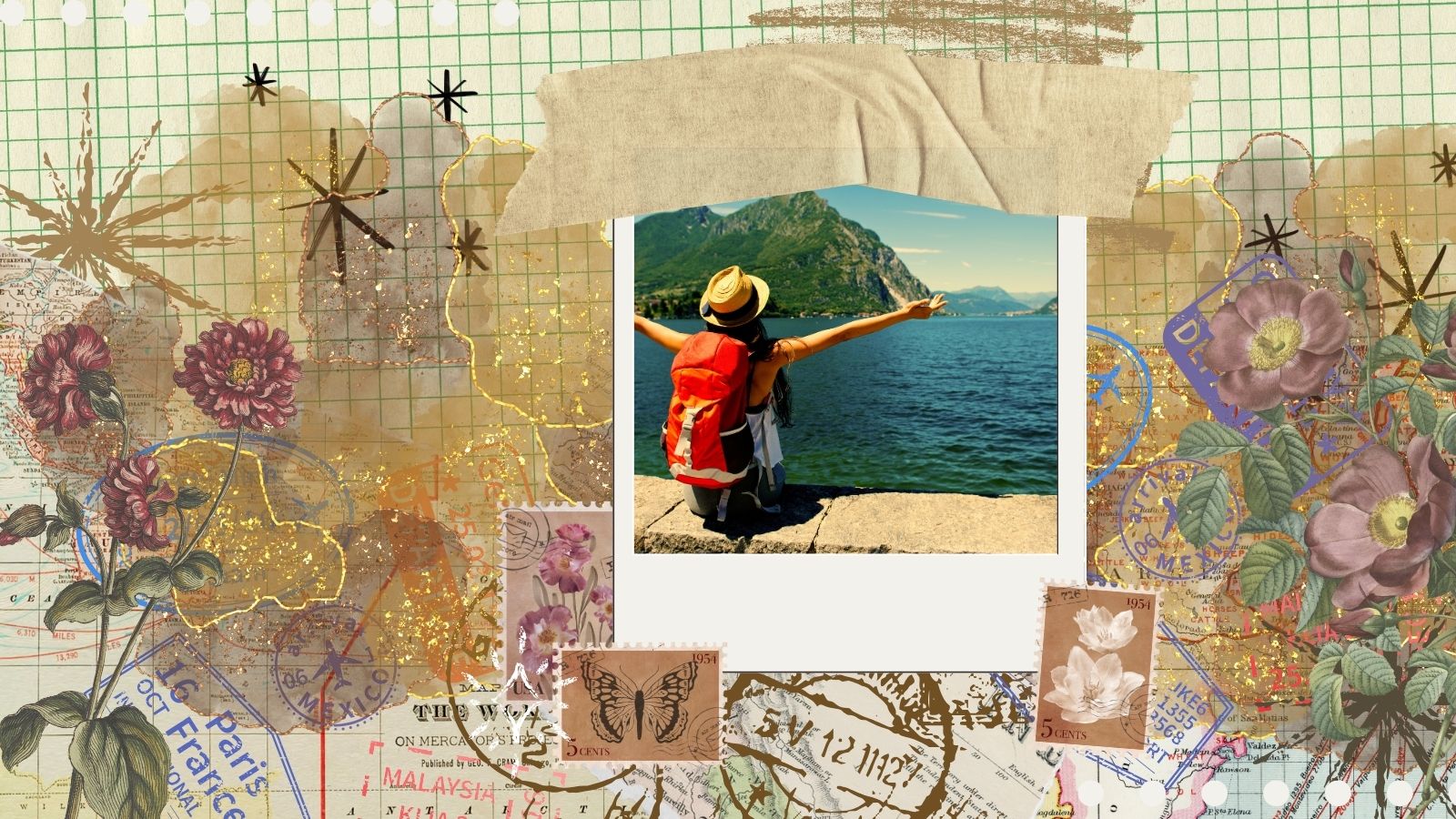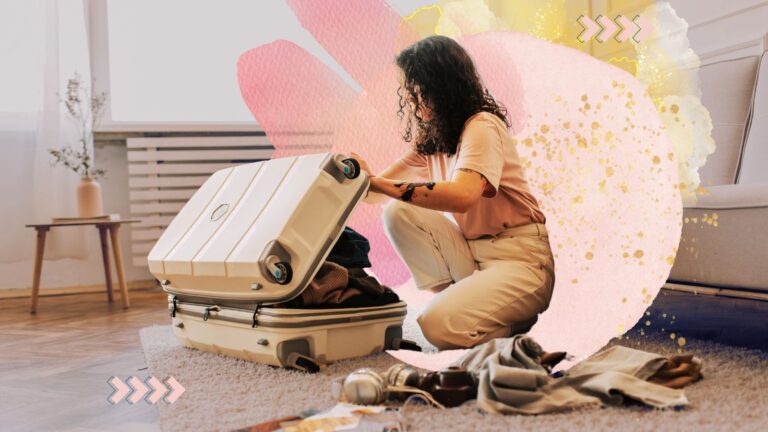Staying Safe as a Solo Female Traveler
I’ve been traveling full-time for over two years now, entirely solo. In the beginning, I was SO nervous and worried that I didn’t even want to go to a non-English speaking country for like 6 months.
But eventually, as I got used to being alone and traveling independently, I realized that I was actually very good at keeping myself safe.
If you’re about to travel by yourself for the first time, no doubt you’re worried about your safety. The unknown is terrifying, and world travel as a whole is a BIG unknown.
So, this post is for women who maybe haven’t ever traveled solo before and who are worried about staying safe while traveling abroad!
Just Gone Wandering is supported by readers! This post contains affiliate links. If you click on a link and buy something, I get a small percentage at no extra cost to you. Your support helps keep this blog running— thank you! Read full disclosure here.
Things to keep in mind
First off: most places are perfectly safe for solo female travelers!
It’s easy to fall into worrying about potential threats, but just going somewhere solo doesn’t mean you’re always 100% in extreme danger.
Second: everyone’s safety tolerance level is different.
Some people have a higher tolerance for cat-calling or being annoyed by men, while others have no tolerance at all.
I personally have a somewhat high level of “safety” that other people might think is dumb, and which might mean I miss out on some experiences, but it makes me feel better so I keep doing it. Others may take more risks because they have a different safety tolerance level than me.
The key is to be safe, but not be SO cautious and afraid that you never travel at all! Take these tips and adapt them to fit your own level of safety comfort while traveling, and go forth into the world!
new!

Effortless Trip Planning, All in One Place
Say goodbye to disorganized travel chaos! Everything you need, from pre-trip planning to your daily itinerary to your return home, in one simple tool.
Solo female travelers: General travel safety tips
Very basic how-to-stay-safe tips for anyone of any travel experience!
- Keep copies of your passport and credit cards/debit cards in a separate place from your purse/wallet.
- If your bag gets stolen, you’ll have these copies as back-up until you can new ones!
- Don’t flash jewelry or tech when out on the street.
- Even cheap costume jewelry can make you a target in some places, so it’s better to just not wear anything besides, say, a woven thread bracelet or something extremely basic.
- If somewhere feels weird, leave. If someone gives you the creeps, leave.
- Don’t be afraid to just turn around and go back, or to leave somewhere entirely. If you’re rude, so what? You’re never going to see those people again, probably.
- Walk with confidence and cultivate a resting bitch face.
- If you’ve ever lived in a big city before you probably already know how to do this!
- Some cultures are smiley-er than others; if locals walk around smiling at each other then it’s probably fine, but if everyone BUT you has a scowl, then don’t be the odd one out.
- Don’t wander off with a local (man OR woman) just because they offer to take you somewhere.
- It’s easy to go with the flow and be excited for a spontaneous travel adventure, but if you wouldn’t wander off with a random person in your home town then don’t do it when you’re abroad.
- The exception is if you’re asking for directions; most of the time that’s fine and they really are just trying to help.
If you have personal safety things you regularly carry in your hometown, you can probably bring some of them abroad.
Stuff like a whistle, or loud alarm, is fine. However, pepper spray, knives, etc. are often banned in other countries so be sure to double-check what you can bring or not.

When to tell (or not tell) people that you’re traveling solo.
This question comes up a lot! And the answer depends on where you are, how safe you feel, and what the goal is for telling (or not telling) people that you’re a solo female traveler.
There can be good reasons for telling people you’re solo: you can find people to go around town with, or split a tour guide fee, etc.
On the other hand, you don’t necessarily want EVERYONE to know you’re alone in a foreign country. It could make you a target for theft, if nothing else.
Here’s how I handle it, after being a full-time solo traveler for over two years:
DON’T tell taxi drivers, private tour guides, random museum docents or baristas, etc. that you’re a solo traveler.
These are people that either I’m depending on for my safety or just random folks I meet around town: neither need to know that I’m alone, so I always say I’m either meeting friends or my husband.
Taxi drivers are actually the most annoying about this, so I have a ready-made fake husband/fiance/boyfriend I can talk about if they ask. It’s always why I prefer public transit if possible, as ironically it feels safer than private taxis a lot of the time!
DO tell other travelers at the hostel and people in group tours.
Finding other solo travelers in hostels is how I’ve made some of the best travel friends around the world!
Hostels are relatively safe in that everybody just wants info on cool places to go, or maybe find someone to split a taxi. Same thing with group tours, especially day tours or walking tours.
Of course, go with your gut in these situations. If someone at the hostel is acting weird, giving them personal information maybe isn’t the best idea.
Read more: Should I tell people I’m alone? and other questions from solo female travelers

Staying safe in hostels, hotels, and guesthouses.
The easiest way to pick safe places to stay is to read reviews from other guests, stay in highly-rated places, and to check the neighborhood around the hostel.
It DOES mean sometimes spending a bit extra on a room, but I’d happily pay $5 more/night if it means staying in a hostel with 24/7 front desk coverage, security cameras, and locks on all the doors.
Safety things to look for in hostel reviews:
- Are there locks on the dorm door? OR
- Is there a separate locked door from the public area to the guest area?
- Are there lockers for guests’ belongings?
- Is the front desk staffed, and for what hours during the day?
- Are there cameras in the hostel? Where?
- Does the hostel let locals stay, or only travelers?
- Anything someone says about the neighborhood, good or bad.
I always check reviews on Hostelworld, Booking.com and Google Maps before booking somewhere.
The other thing I do (which people might think is over-the-top) is:
I NEVER talk to guys IN a mixed dorm.
I’ll happily talk to them outside in the common area, but never IN the dorm itself. In mixed dorms I’m a ghost! I’m only there for sleeping and relaxing from a day out, not for chit chat (or romance)!
Ideally choose a female-only dorm to stay in, but sometimes there aren’t any available. Worse, sometimes the front desk people will book 1 woman and 7 guys in the same room– ugh!! If that happens, you can always ask to switch rooms.
For hotels and guesthouses: same thing. Check reviews, especially from other women travelers and ESPECIALLY about the owners/staff.
When you check in, make sure your room door locks properly and securely. You can use one of these portable door locks as an extra deterrent.
I also keep a list of recommended hostels/hotels on my Google Maps. Asking in Facebook travel groups is a good way to get personal recommendations direct from other solo female travelers.

Late-night arrivals and other problems
I hate coming into a new town or country late at night, but sometimes it’s unavoidable. The worst is when you’ve had a LONG travel day and arrive exhausted, then still have to navigate to your hotel.
This exact situation is often when women get into trouble– either the taxi driver tries to do something, or you get to your hotel and it’s totally unsuitable but you’re too tired to do anything. Often it’s compounded by not having any local money or a working SIM card, so you can’t even leave quickly to go to a new place.
The solution: Plan your arrival!
Get an eSIM before you arrive, even if it’s only a small one for a day or two. I use Airalo to get my eSIMs and it works very well.
Get some money at the airport. If the money exchange place is closed, the ATM should still work. If both are gone, then you’ll have to rely on your stash of USD or Euros in case of an emergency, until you can get to an ATM later.
Book an airport transfer. If you’re staying at a proper hotel or guesthouse, they’ll sometimes offer a shuttle. Otherwise check Klook for discount airport transfers and have it set so they’ll pick you up AT the airport.
Don’t rely on Grab or Uber for this, as depending on your arrival time you might not be able to get a driver anyway. Book a driver through a proper transport company; it shouldn’t cost much more than a Grab and it’s nice to have peace of mind that someone will be waiting for you.
Drink an energy drink and check your hotel room thoroughly. If you’re on the edge and only want to sleep: don’t!
Check your room and make sure it’s a) what you paid for, b) has working locks on the doors AND WINDOWS, and c) has clean linens. Ideally everything will be fine, because you vetted the hotel through reviews and recommendations earlier. 😉
Have a back-up hotel saved to your Google Maps that you can get to, hopefully within walking distance. If your booked hotel is scary, then move. Don’t worry about the money: your safety means more.
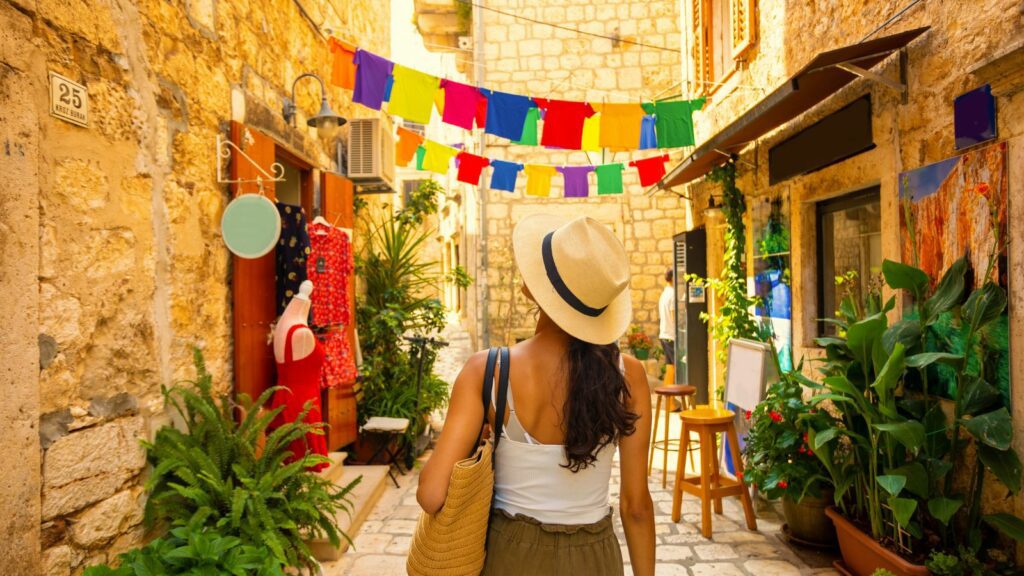
Personal safety when walking around a city
If you’re headed somewhere with a reputation for pickpockets or phone thieves, then you’ve no doubt read all the safety tips for that already.
But basically:
- Keep your valuables close to your body. Use a small cross-body purse, a sling bag, or a waist bag to store your phone/wallet/money. If you use a daypack, don’t put anything in there that you’d be sad to lose.
- Keep a hand on your bag and lock the zipper if you can. Never put your bag behind you, on the floor, or somewhere out of eyesight.
- Only bring enough money out for the day. You won’t need $200 worth of cash if you’re only planing to visit museums and eat street food.
- Don’t stand on the street and use your phone. I’ve gotten into the bad habit of doing this in Japan and Malaysia because it’s super safe, but people have gotten their phones snatched doing that soooo I need to quit it. If you use your phone for photos, take the photo and then put your phone back into your bag immediately.
- Likewise, don’t wait outside of a gate with your phone out looking for your Grab. Wait inside the lobby and then only come out when the Grab says it’s arrived.
Walking alone at night
In places with a big night market culture (most of Southeast Asia), walking alone at night is (usually) totally fine, especially if you’re in the actual market or nearby streets.
The “dangerous” part comes when you need to get back to your hostel– sometimes there’s creepy alleyways that look fine in the daytime but turn into horror movie locations at night.
Two ways to deal with that:
- Book a Grab to go back to your hostel.
- Go out with a group from your hostel so you all walk back together.
Night markets are often crowded and noisy, great places for some casual pickpocketing!
🌟TIP: Group tours are a great way to explore a city at night safely! Check places like Get Your Guide and Viator for night tours in your destination.
Staying safe at pub crawls
Hostels will often have pub crawls nights where guests can all go out together and visit several clubs or bars. These can be really fun!
Use your common sense here: don’t get so drunk that you can’t make it back to the hostel by yourself, keep an eye on your drink at all times, and only bring enough cash out to pay for your drinks. Better still if you buddy up with another hostel guest and you look out for one another.
Read more: How to make friends when you’re traveling solo

Luggage tags, location sharing, and other stuff
I’ve recently started using AirTags for my luggage and purse, mostly for the “just in case” situation of an airline losing my suitcase. But it’s also good if my backpack or purse go missing! I got a set of 4 AirTags on Amazon for a good price. The one in my purse is on this keychain holder so I also use it to keep my AirBNB/hotel keys.
Related: The Ultimate Tech Guide for Full-Time Travelers
Personally, I don’t use location sharing on my phone but I do know some travelers who have it turned on for their families.
I message my parents on WhatsApp all day every day anyway, so I don’t feel the need to have my phone tracking me as well, but for other folks it might be a good idea.
Even if you don’t do either of those things, sending your itinerary (even a general one) to a trusted family member is a good idea. That way, if they haven’t heard from you in a while, they have an idea of where to possibly send help.
Government safety apps & sites
The US State Department has a Smart Traveler Enrollment Program (STEP) that you can register your trip with, and they’ll send you alerts if something horrible happens while you’re traveling. I am the WORST about doing this, but it’s a good habit to get into. You can sign up for email or text alerts.
You should also keep copies of the local US embassy address/phone number in your phone and somewhere separate– in case your stuff gets stolen and you need a new passport, you’ll have contact info for getting that process started.
Final thoughts
I hope these safety tips help you on your own travels!
It might seem scary to travel solo in the beginning, but the nice thing is that once you get more experienced you’ll be able to discern how risky a situation is or isn’t, and you’ll be a lot more confident traveling to new places.
Save to Pinterest
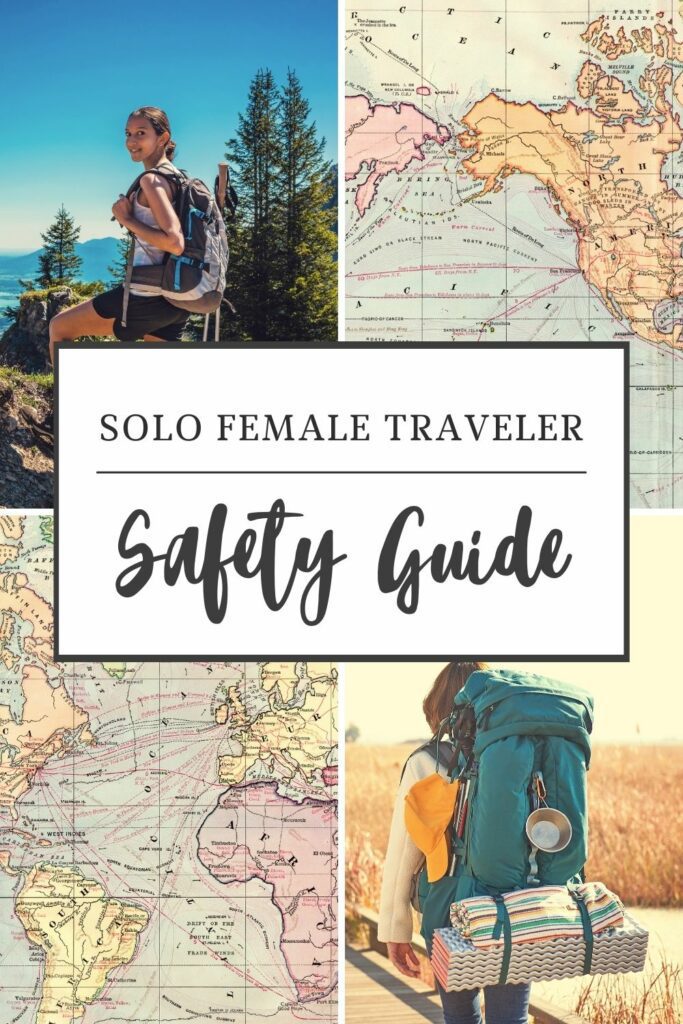
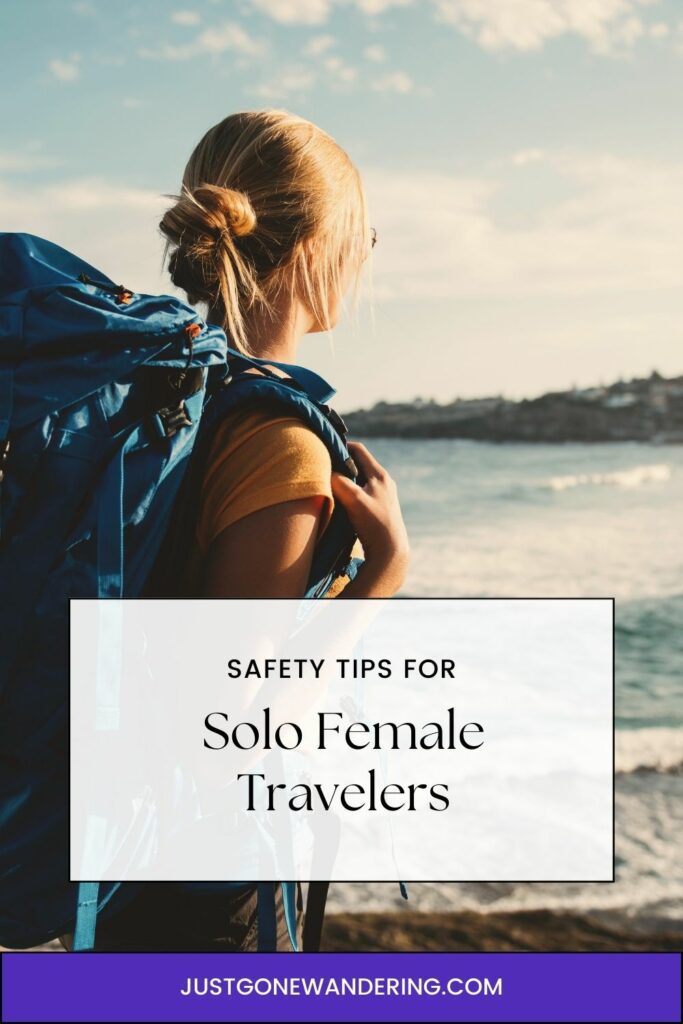
Explore More
Solo Female Travel
- Top 5 Countries for First-Time Solo Travelers to Visit
- Going on Your First Solo Trip: Tips for First-Time Travelers
- Safety tips for solo female travelers
- Should I tell people I’m alone? and other questions from solo female travelers
- How to make friends while traveling solo
- How to Book a Group Day Tour as a Solo Traveler
- Best Facebook Groups for Solo Female Travelers
- How to Get Great Photos of Yourself While Traveling Solo
Destination Travel Guides
Best Travel Resources
- 👩💻Stay organized with the Deluxe Travel Planner Spreadsheet
- 🛌Search Hostelworld for budget stays
- ✈️Search SkyScanner for discounted flights around the world
- 😺Join TrustedHousesitters and do petsitting in exchange for accommodation
- 💳Carry Chase Sapphire Preferred for a travel-friendly credit card
- 📱Use Airalo for eSIMs around the world
- 🚙Check DiscoverCars for international car rentals
- 👩💻Snag ExpressVPN to stay safe while browsing the web
- 🧑⚕️Sign up with VisitorsCoverage for trip insurance

